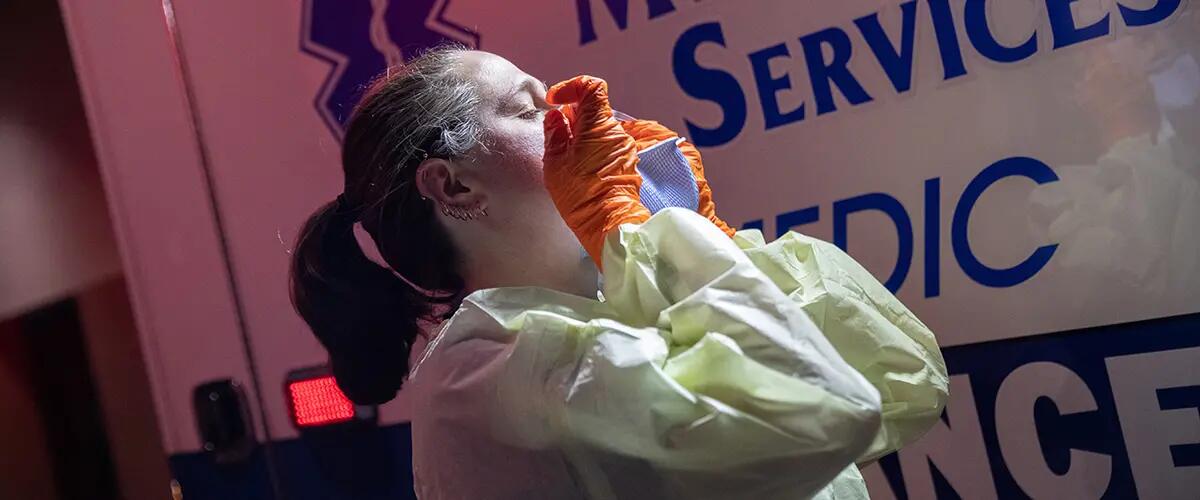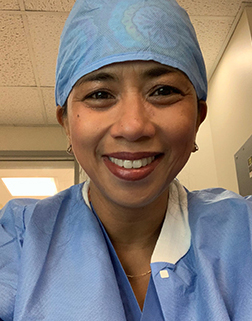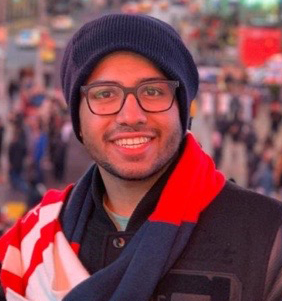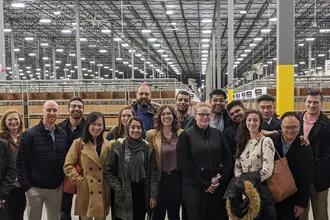
New Jersey's supply chain issues in pandemic become project for graduate students
As the coronavirus spread across New Jersey in April, demand for personal protection equipment soared on the frontlines, quickly creating alarming shortages across the state during the peak of the pandemic.
The lack of protective supplies and then a flood of donations and federal stockpile put the state government in an unfamiliar role of supplier and distributor, supply chain functions that it was not equipped to handle.
For help, state officials turned to Rutgers Business School’s Center for Supply Chain Management. Now, the supply chain issues that created the troubling PPE shortages are driving a semester-long project for a group of Rutgers Business School graduate students.
“This project is like nothing we’ve ever done,” said Professor John Impellizzeri who leads the Center for Supply Chain Management. “To be talking about the opportunity for students to do predictive modeling around the deployment of PPE in the midst of a pandemic, it couldn’t be more relevant.”
When the state reached out to Rutgers Business School, Impellizzeri carried out an immediate “rapid” assessment of the situation. Then he worked with state officials from the Department of Innovation to assemble a steering committee, which included two of the center’s board members from industry, Helen Davis of Estée Lauder and Manish Airen of Panasonic.
Within weeks, the group suggested that the state needed the type of software platform used by industry to provide end-to-end visibility of the state’s PPE supply chain.
Davis, senior vice president of global supply chain, manufacturing, for The Estée Lauder Companies, said it didn’t seem like enough just to provide recommendations for what could be done better. “It would be much better if we could actually develop a platform for the State of New Jersey to help manage the entire supply chain thereby also preparing for other potential crises or needs beyond PPE,” she said.
“Without a supply chain department, my fear was who would carry out the steering committee’s recommendation,” she said. The steering committee discussed the idea of students doing the pilot as an industry client project, a mandatory class and experiential learning experience for all supply chain students at Rutgers. The state’s Department of Innovation “took it to the right people,” Davis said. “They pushed it down the road.”
The agreement created one of the supply chain management department’s most compelling industry client projects. “I think it’s great for the students,” Davis said. “It’s real life. It’s taking their theoretical education and bringing it to life.”
Professor Joseph Agresta, who works with companies to generate suitable ideas for the three-credit industry client project class, said he knew the project with the state would require more senior-level students.
To recruit them, he targeted students in the Master of Science in Healthcare Analytics and Intelligence Program and the Master of Science in Supply Chain Analytics Program. There was a catch: The work would begin Aug. 1, more than a month before regular classes resumed for the fall. Still, Agresta said the response from students was “overwhelming.”
Cheryll Jarvis, a nurse in the Master of Healthcare Analytics and Intelligence Program, was among the students who jumped at the chance to work on the project.

When the Covid-19 Outbreak occurred, Jarvis was re-assigned from the cardiac unit at Robert Wood Johnson to the front line, treating patients in the hospital’s Intensive Care Unit. “I’ve been a nurse for 24 years, and it was the worst thing I’ve ever seen,” she said. “There was just so much death.”
At her hospital, gowns, gloves and masks were distributed daily. With masks in short supply, the hospital began sterilizing them so they could be reused safely. “I never had to worry that I would not be prepared with PPE,” Jarvis said. She said she knew other health care professionals in the state were not as fortunate.
Jarvis took the summer off from classes after the intensity of the Covid-19 Outbreak, but she didn’t miss the email her program director, Professor David Ding, sent out about the project. “I want in,” she told him.
Jarvis and seven other students from the programs have been divided into two teams. Each group is learning one of two software programs that Rutgers helped to secure as donations from vendors. Both systems are used by the private sector and are considered first in class, Impellizzeri said.
The steering committee’s plan, he said, is to have “a bake off” between the teams with each making a presentation to state officials about their system’s abilities and the benefits to the state. The choice of what platform to use and who will operate it rests with the state.
The students bring a diverse set of perspectives and skills to the project. Like Borja, some have experience in health care. Others bring a knowledge of supply chain. Once they understand how the systems work, they will test the system’s ability to meet needs of the state, including such things as monitoring the spread of new Covid-19 infections and the supplies of PPE.
“The students are racing against the clock, trying to get it done ahead of a possible Wave 2,” Airen said. “It will be a huge difference in terms of quality of life for citizens of New Jersey.”
Like Davis, Airen said the system will be critical beyond PPE. The systems being piloted by the students are agile enough to be essential in helping to distribute vaccines or managing emergency supplies in a natural disaster.
Airen, who joined the Center for Supply Chain Management board at Rutgers about five years ago, sets up supply chains for Panasonic’s business to business products. He said the dire shortages in PPE resulted from fundamental supply chain issues. And New Jersey wasn’t alone.
“One thing the pandemic has proven is that every state needs supply chain expertise,” Airen said. “Every state needs to figure it out.”
While the steering committee is driving the project, the students are working closely with Professor Agresta and Anna Pisklarov, a new Rutgers Business School graduate is working full-time as a liaison between the state government and Rutgers.
There are meetings twice a week between the students and members of the steering committee as well as Pisklarov and a project manager from the state. The steering committee members work with the project manager and Pisklarov to monitor the progress of the teams and settle issues. “This is exactly what you do in industry,” Impellizzeri said.

Shaun Gilson, who is expected to complete a master’s degree in Supply Chain Analytics this year, said the project has allowed him to dive deeper into supply chain, applying concepts from his classes in operations analysis and project management. “It’s been eye-opening,” he said.
Impellizzeri said the collaboration occurring between Rutgers Business School and New Jersey is showcasing the Supply Chain Management Department in a variety of ways. In addition to the talent of the students, Davis and Airen have shared best practices and served as a sounding board for the governor’s team.
The board typically provides Rutgers supply chain faculty with insights about the industry and influences what students learn in the classroom to prepare them for jobs. “This is a way that we never thought we would have to use them,” Impeliizzeri said.
“For the state to collaborate with Rutgers because of its strength in supply chain management, to seek the university’s help to ensure the safety of its citizens, it’s a huge deal,” Impellizzeri said. “It’s a tremendous collaboration.”
The potential impact of the project isn’t lost on the students who volunteered to be part of it.

Khushali Sureja, who is in the Master of Healthcare Analytics and Intelligence Program, said she has family members in healthcare who told her firsthand about the horrors of the shortages.
“Hospitals were really struggling,” she said. “I literally jumped at the chance to be part of the project.”
The assignment is allowing her to apply the concepts she learned in courses like operations analysis and data analysis. Like Jarvis, she’s had to familiarize herself with some of the supply chain concepts since her background is healthcare. Yet, it’s the potential impact that really excites her about the work.
“Plenty of students will be working on an industry client project this semester,” she said. “Our contribution on this project is very important.”
Jarvis said the project is daunting, requiring her to learn a lot about supply chain concepts and how data drives decision-making. “My experience drove me to want to be part of the project,” she said. “I hope this will help in another crisis. What I went through was scary.”
- Susan Todd
Press: For all media inquiries see our Media Kit


